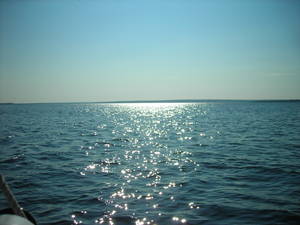The Conservation Hotlist - Planet Earth Online
Interview with
A new study into the top conservation issues facing the World gives an insight into the environmental problems we may be reporting on in the coming years. Compiled by an international team of experts, its concerns include: mining in the deep sea for rare Earth elements and invasive species in Antarctic waters, as well as new technologies including the rapid development of graphene. Planet Earth Podcast presenter Richard Hollingham went went to the University of Cambridge to speak to the leader of the research, Bill Sutherland...
Bill - We see our role as identifying issues that we think warrant greater research and then feeding that research into the policy process, so that policy makers can be more informed and make better decisions when they need to do so.
Richard - Let's look at the list here which I've got in front of me. I won't run through all 15 issues but there's certainly a key theme with the first four. All marine conversation - you talk about warming of the deep sea, mining in the deep ocean, methane venting from the ocean floor and climate driven colonisations in Antarctic waters, by which you mean invasive species moving into these pristine Antarctic territories.
Bill - Absolutely, and I noticed that theme too. I think partly it's because there are some serious marine problems but also the technology is improving so we're learning a lot more about marine habitats and we're beginning to identify some of the serious up and coming threats.
there are some serious marine problems but also the technology is improving so we're learning a lot more about marine habitats and we're beginning to identify some of the serious up and coming threats.
Richard - One of the other issues I was quite taken with on this list was graphene. This year, the UK government has put £50M into graphene research, there have been Nobel Prize winners for graphene research. It's seen as the next big technological thing.
Bill - Absolutely. And nanotechnology is clearly an enormous area and there are lots of exciting possibilities including lots of exciting environmental possibilities, including graphene. As a material, it has all sorts of exciting properties that can be of great benefit. What we do is we say that we really want to then look at what the consequences of that might be and just make sure that there aren't any unforeseen environmental consequences, bearing in mind there's likely to be such a huge change with the development of nanotechnology.
Richard - Is that what a lot of this is about? Seeing a new technology and saying what are the implications of that for the environment?
Bill - Very often and I think often as environmental scientists, we've not been very good at that. I think for the GM debate we didn't actually have the science in place when the major decisions had to be made, so we want to look ahead and make sure we've got the science in place for new technologies, and for other issues as well, so that we can foresee what the debate might be and make sure the debate is better informed.
Richard - The other one on the list - I didn't even know what these were - are nuclear batteries. What is a nuclear battery and why are you worried about it?
Bill - Nuclear batteries are a new way of generating energy. You can do it very much on a small scale and that means that you can then have energy sources in new areas and that adds benefits for environmental monitoring. It also means you can create development in areas that would otherwise be impossible. And we're interested in identifying any major environmental disruption, any environmental change that might change the way the world looks and it was thought that that might be one of these sorts of features.
Richard - I suppose just off the top of my head the obvious problem with a nuclear battery is what happens when someone throws it away.
Bill - Absolutely, that is a major problem and they are much less polluting than nuclear power stations but obviously they have serious issues related to the waste. They also, by providing easy sources of energy if they are widely developed, will result probably in different patterns of development and we're interested in then predicting what the consequences of those might be.
Richard - Just a few metres away from your office is the Zoological Museum here in Cambridge and it's quite sobering walking around to see the number of extinct birds on display, along with fossils- there's a giant sloth. Is that something that keeps you going, saying we don't want another one of those?
Bill - Absolutely. We're committed in Cambridge to developing conservation and making conservation more related to policymakers with the hope that we can then reduce the likelihood of future extinctions. That's clearly extremely important and we're deeply committed to it.
Richard - This is the third year you've done it, can you look back and say, well we identified that or can you look at any successes?
Bill - The one we like the most, but I think is probably a complete coincidence, is in the first one we did we identified the issue of high latitude volcanism and particularly what would happen if Icelandic volcanoes went off. Then, a couple of months later, that happened! I've been accused of trying to set it off, I think that's just fortuitous. But a number of the other issues have very much come up the agenda since. So fracking, we identified fracking in our meeting two years ago - the issue of generating gas by pumping water into rocks. That's now a major environmental concern.










Comments
Add a comment